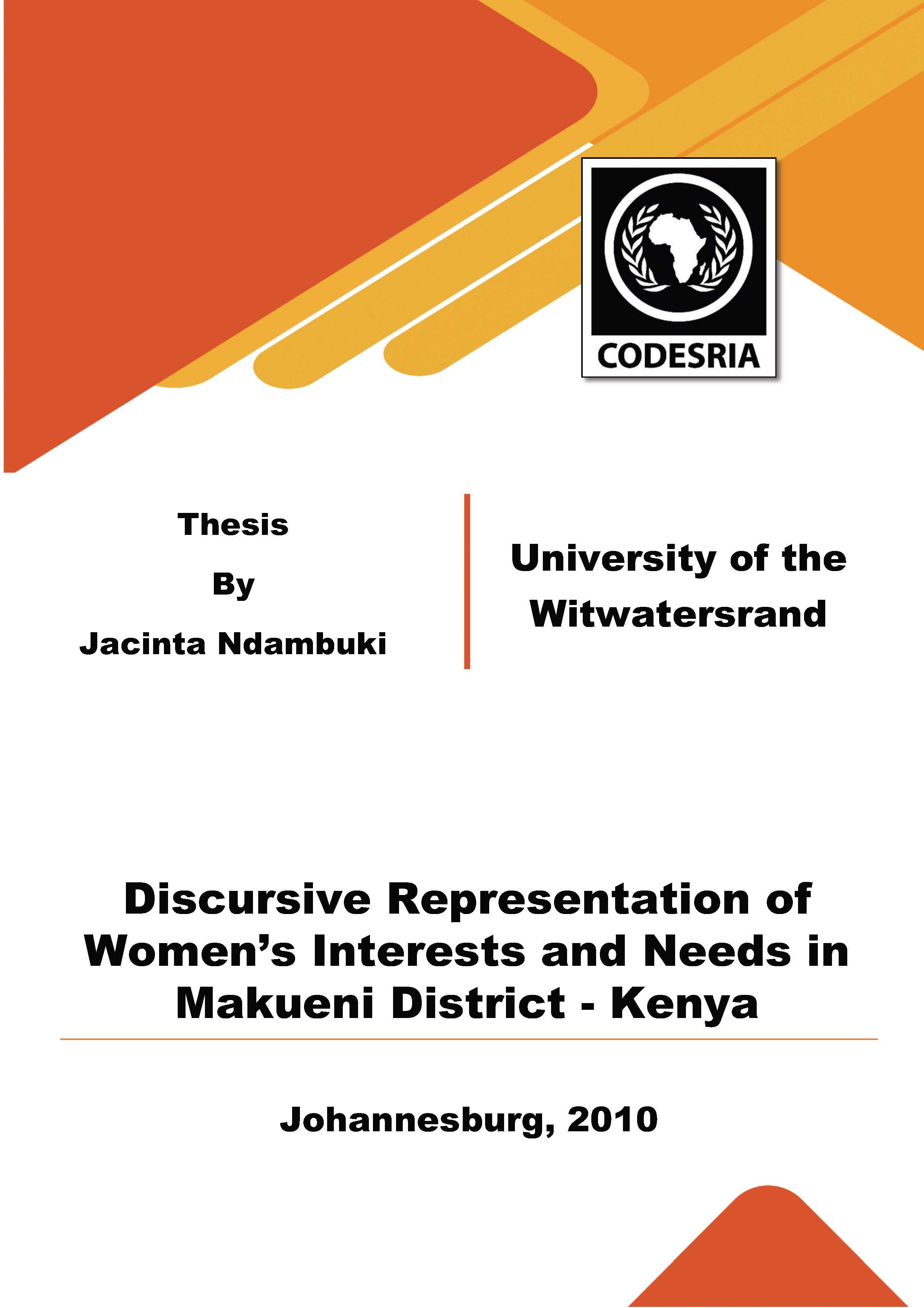Discursive Representation of Women’s Interests and Needs in Makueni District - Kenya
Keywords:
Women, Needs, Makueni District, KenyaSynopsis
The thesis deals with the discursive representation of women’s interests and needs in Makueni District, a rural area in the eastern part of Kenya. The study explores the mismatch between the way politicians and other community leaders select and represent these interests and needs and the way women construct these issues in women’s groups. It provides a fresh approach to the study of women’s issues by using a Critical Discourse Analysis (CDA) as a means of uncovering the subtle ways in which the representation of these issues interfaces with questions of power. The thesis explores the overall question: how does a study of the language used to talk about women’s interests and needs help us understand the constraints and possibilities for women with regard to agency and change? Data was collected from political rallies, interviews and focus group discussions. The data for the entire study consists of four political speeches, ten interviews with politicians and other community leaders and eleven focus group discussions with women’s groups. CDA as theory and method provides a framework for understanding how prevailing discourses impact on the participation of women in the political process in Kenya.
A key finding of the research is that though women, politicians and other community leaders construct women’s agency within deficit discourses, these discourses do not match women’s enacted practices or what political and community leaders say they expect of women. The contradiction that emerges from the study is that although everyone constructs women as lacking in agency, these women act as agentive subjects. All these three categories of research participants draw on prevailing discourses about women in Kenya which locate women is a discourse of negative representation. This language reflects and reproduces the exclusion of women in the political process because it is hard for women to believe that they have a contribution to make when they are interpellated by these deficit discourses. Women for example continuously demand for a leader, a mentor and a saviour; an individualized discourse yet agency and sustainability depend on the collective. Further, my research has shown that women’s groups that are the focus of this study (popularly known as merry-go-rounds in Kenya) are not ‘feminist’ groups. While the aim of feminist groups is transformation, the aim of the women’s groups is sustainability.
Overall, the study shows that women’s power is located in traditional discourse and collective action is at the heart of women’s ability to sustain their existence and their communities. Women’s inaction on the other hand is located in deficit discourses, a negative discourse on women. If they were to understand and recognize the power of the collective, and that power is in the collective and not in an individual leader, they might choose to influence the political process in a different way. Such understanding might provide different possibilities for political agency and transformation. The key finding of this research is the need to change the discourse of negative representation so that women can recognize their own potential for power.
Downloads
References
Ogola, M. (2003) Interview, pp. 123-147. In Ed. Kuria, M. Talking Gender: Conversations with Kenyan Women Writers. Nairobi: PJ.
Ogot, G. (2003) Interview, pp.71-97. In Ed. Kuria, M. Talking Gender: Conversations with Kenyan Women Writers. Nairobi: PJ.
Ogot, G. (1978) Women’s Perception of Themselves and Other Women. In Eds. Pala, A. Awori, T. and Krystal, A. Conference Proceedings of The Participation of Women in Kenyan Society held in Nairobi 11-15 August 1975. Nairobi: Kenya Literature Bureau.
Okombo, D. O. (2001) Language Policy: The Forgotten Parameter in African Development and Governance Strategies. Inaugural lecture delivered to the University of Nairobi and the Kenyan Public. Thursday 4th October, 2001.
Olaleye, W. (2003) Legitimising Electoral Process: The Role of Kenyan Domestic Observation Programme (K-DOP) in Kenya’s 2002 General Election. Journal of African Elections, Vol. 2, No. 2, 14-29.
Olukoshi, A. (1998) State, Conflict and Democracy in Africa: The Complex Process of Renewal pp. 453-466. In Ed. Joseph, R. State, Conflict and Democracy in Africa. Boulder, Colo: Lynne Rienner Publishers.
Obama, B. (2006) The Audacity of Hope: Thoughts on Reclaiming the American Dream. New York: Crown Publishers.
Onyango, O. (2006) The Dark Shadow of Masculinities and Women’s Emancipation Agenda.
CODESRIA Bulletin Special Issue on the African Woman. Vols.1 and 2, pp. 36-38.
Orwell, G. (1995) Politics and the English Language, In Ed. Jackall, R. Propaganda. New York: New York University Press.
Phillips, A. (1991) Engendering Democracy. Cambridge: Polity Press.
Popkewitz, T.S. (2007) Cosmopolitanism and the Age of School Reform: Science, Education and Making Society by Making the Child. London: Routledge.
Puchta C. and Potter, J. (2004) Focus Group Practice. London: Sage.
Quinlan, T. and Wallis, M. (2003) Local Governance in Lesotho: The Central Role of Chiefs. In Eds. Ray, D and Reddy P. Grassroots Governance? Chiefs in Africa and the Afro-Caribbean.
Alberta: University of Calgary Press.
Republic of Kenya: Report of Women Groups Census in Kenya Eastern Province. Women’s Bureau UNFPA Project (1992).






